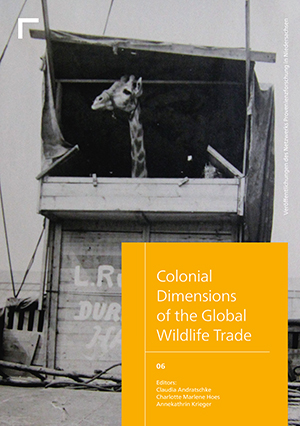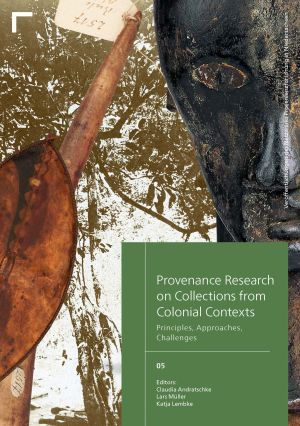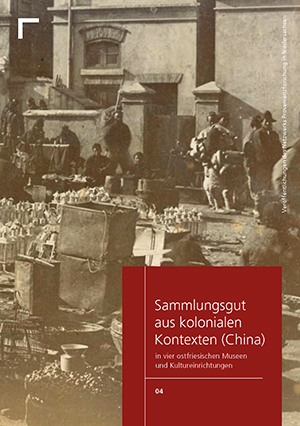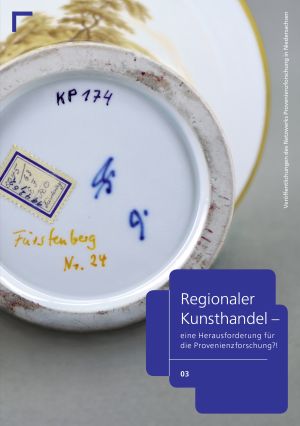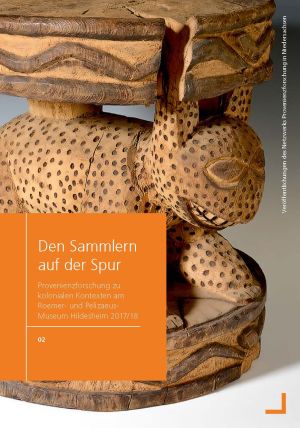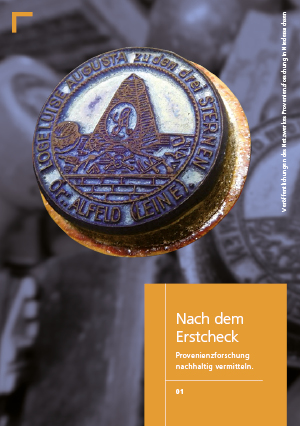Veröffentlichungen des Netzwerks Provenienzforschung in Niedersachsen
Im Bewusstsein seiner kulturpolitischen Verantwortung im Sinne der „Washingtoner Prinzipien“ und der „Gemeinsamen Erklärung“ hat das Land Niedersachsen 2015 das Netzwerk Provenienzforschung gegründet. Es bündelt die Kräfte und Kompetenzen im Bereich der Provenienzforschung auf Landesebene und verzahnt sie mit den Initiativen der Stiftung Deutsches Zentrum Kulturgutverluste.
In der vorliegenden Reihe veröffentlicht das Netzwerk Provenienzforschung in Niedersachsen die Ergebnisse der jährlich veranstalteten Tagungen sowie ausgewählte wissenschaftliche Beiträge seiner Mitglieder und Partner. Im Fokus der Netzwerkarbeit stehen alle relevanten Kontexte der Herkunftsforschung: Recherchen zu NS-Raubgut und Provenienzforschung zu Sammlungsgut aus kolonialen Kontexten sowie zu Kulturgutentziehungen in der ehemaligen Sowjetischen Besatzungszone und der DDR.
![]()
Contact
Dr. Claudia Andratschke
Koordinatorin
Netzwerk Provenienzforschung in Niedersachsen
Landesmuseum Hannover
Das WeltenMuseum
Willy-Brandt-Allee 5
30169 Hannover
Email: info@provenienzforschung-niedersachsen.de
Internet: www.provenienzforschung-niedersachsen.de
Erscheint demnächst
Pflanzen – Tiere – Menschen im Dazwischen
Der Band versammelt die Beiträge der Konferenz „Pflanzen – Tiere – Menschen: Präparieren, Konservieren, Ausstellen. ‚Doing Objects‘ in historischer und aktueller Perspektive“, die im Oktober 2024 an der Georg-August-Universität Göttingen veranstaltet wurde. Die als Kooperation des Lehrstuhls für Mittlere und Neuere Geschichte der Georg-August-Universität Göttingen und des Netzwerks Provenienzforschung in Niedersachsen durchgeführte Konferenz wurde durch Mittel des Programms „zukunft.niedersachsen“ gefördert. Ziel war es, Akteur:innen mit unterschiedlichen Perspektiven, darunter Kultur- und Naturwissenschaftler:innen, Präparator:innen und Restaurator:innen, zu versammeln, um Debatten zum Umgang mit Präparationen und Modellen auf Basis menschlicher, tierischer und pflanzlicher Materialität zu diskutieren. Zudem wurden bislang kaum beachtete, thematische Überschneidungen hinsichtlich konservatorischer Praktiken wie dem „Doing Objects“ in historischer und aktueller Perspektive ausgelotet.
Das Projektformat „Erstcheck: Koloniale Kontexte“
Seit 2021 ist es möglich, bei der Stiftung Deutsches Zentrum Kulturgutverluste kurzfristige Projektanträge für „Erstchecks: Koloniale Kontexte“ zu stellen. In einer Projektlaufzeit von bis zu sechs Monaten können antragsstellende Institutionen Recherchen durchführen, um sich einen ersten Überblick über potenzielle Verdachtsfälle zu verschaffen und damit nicht nur weitere Forschungsbedarfe zu ermitteln, sondern auch um auf konkrete Auskunftsforderungen zu reagieren. Stand Juni 2025 wurden 13 Projekte dieser Art beantragt. Um hier eine erste Bilanz zu ziehen und das eigene Projekt zu Beständen aus Subsahara-Afrika in einen größeren Kontext einzubetten, organisierten das Netzwerk Provenienzforschung in Niedersachsen und der Museumsverband für Niedersachsen und Bremen e.V. zwei Workshops, auf denen sich Projektmitarbeiter:innen, antragsstellende Institutionen und Vertreter:innen Dekolonialer Netzwerke austauschten. Der vorliegende Band dokumentiert diese Beiträge und damit die vielfältigen Erfahrungen, Ergebnisse und Herausforderungen und fragt, wie sich Erstchecks möglichst nachhaltig gestalten lassen.
Bisher erschienen
Colonial Dimensions of the Global Wildlife Trade
Der Band ist im Rahmen einer internationalen Konferenz entstanden, die im November 2022 an der Georg-August-Universität Göttingen stattfand. Ziel war es, die kolonialen Verflechtungen des globalen Wildtierhandels in der ersten Hälfte des 20. Jahrhunderts und dessen Verbindungen zu anderen Handelsformen, etwa mit menschlichen Überresten, tierlichem Material oder ethnografischen Objekten, zu untersuchen. Insbesondere die Nachwirkungen dieses Handels – etwa in den Ausgangsregionen, aber auch in europäischen und nordamerikanischen Museen – werden in den Beiträgen beleuchtet.
Die Konferenz und der Band stehen im Zusammenhang mit dem Projekt „Die globalen Handelsnetzwerke der Alfelder Tierhandelsunternehmen Reiche und Ruhe – Provenienzforschung zur Zirkulation von Tieren, Menschen und Ethnographica im 19. und 20. Jahrhundert“, das am Lehrstuhl für Neuere Geschichte der Universität Göttingen angesiedelt ist und vom Deutschen Zentrum Kulturgutverluste gefördert wird. Es wird in Kooperation mit dem Museum der Stadt Alfeld und dem Netzwerk Provenienzforschung in Niedersachsen durchgeführt.
Provenance Research on Collections from Colonial Contexts: Principles, Approaches, Challenges
Der Band versammelt die Beiträge der gleichnamigen internationalen Konferenz, die im Juni 2021 in der Leibniz Universität Hannover veranstaltet wurde. Die Konferenz wurde von dem am Landesmuseum Hannover koordinierten Verbundprojekt „Provenienzforschung zu außereuropäischen Sammlungen und der Ethnologie in Niedersachsen“ (PAESE) geplant. Ziel war es, Akteur*innen aus unterschiedlichen Perspektiven zusammenzubringen, um Fragen, Methoden und (vorläufige) Ergebnisse im Bereich der Provenienzforschung zu Sammlungsgut aus kolonialen Kontexten zu diskutieren.
Sammlungsgut aus kolonialen Kontexten (China): In vier ostfriesischen Museen und Kultureinrichtungen
Der Band versammelt die Beiträge der gleichnamigen Abschlussveranstaltung sowie die Ergebnisse eines vom Deutschen Zentrum Kulturgutverluste geförderten, durch das Netzwerk Provenienzforschung in Niedersachsen unterstützten und von der Museumsstelle der Ostfriesischen Landschaft koordinierten Projekts. Facts & Files, Historisches Forschungsinstitut Berlin, untersuchte dabei rund 500 Objekte in vier ostfriesischen Einrichtungen (Dt. Sielhafenmuseum Carolinensiel, Naturforschende Gesellschaft zu Emden von 1814, Ostfriesisches Teemuseum Norden und Fehn- und Schiffahrtsmuseum Westrhauderfehn) auf mögliche koloniale Kontexte in Bezug zu Qingdao, dem ehemaligen „Schutzgebiet“ des damaligen Deutschen Reiches.
Regionaler Kunsthandel: Eine Herausforderung für die Provenienzforschung?!
Der Band versammelt die Beiträge der gleichnamigen Online-Tagung am 1. März 2021, veranstaltet vom Bomann-Museum Celle. Die Quellenlage für die Provenienzforschung zum regionalen Kunsthandel ist oft schwierig, weil Geschäftsunterlagen oder Auktions- und Verkaufskataloge meistens nicht erhalten sind. Daher stand im Zentrum der Tagung die Frage, wie dennoch eine bestmögliche Provenienzforschung gelingen kann. Die einzelnen Beiträge gehen dem anhand von Beispielen aus verschiedenen Museen und Forschungsprojekten in Norddeutschland nach.
Den Sammlern auf der Spur: Provenienzforschung zu kolonialen Kontexten am Roemer- und Pelizaeus- Museum Hildesheim 2017/18
„Den Sammlern auf der Spur“ präsentiert die Ergebnisse eines Provenienzforschungsprojektes, das 2017/18 am Roemer- und Pelizaeus-Museum Hildesheim durchgeführt wurde. Im Fokus standen Herkunft und Erwerbungsumstände von ethnografischen Objekten, die um die Wende vom 19. zum 20. Jahrhundert aus den umfangreichen Beständen des Königlichen Museums für Völkerkunde Berlin nach Hildesheim gelangten. Die meisten dieser Gegenstände von nahezu sämtlichen Erdteilen stammen aus kolonialen Zusammenhängen. Der Schwerpunkt des Bandes liegt auf einer Vorstellung der Sammler und einer Erörterung der sehr heterogenen Umstände, unter denen sie Ethnographica erworben haben.
Nach dem Erstcheck: Provenienzforschung nachhaltig vermitteln
Der Band versammelt die Beiträge der gleichnamigen Tagung am 4. November 2019, veranstaltet vom Netzwerk Provenienzforschung in Niedersachsen, dem Landschaftsverband Südniedersachsen und dem StadtMuseum Einbeck. Herausgeber_innen und Autor_innen behandeln darin, wie die Ergebnisse von sog. „Erstcheck“-Projekten der Provenienzforschung zur Suche nach und Identifikation von NS-Raubgut in Stadt- und Regionalmuseen in Südniedersachsen nachhaltig dokumentiert, partizipativ genutzt und dauerhaft sichtbar gemacht oder vermittelt werden können.




